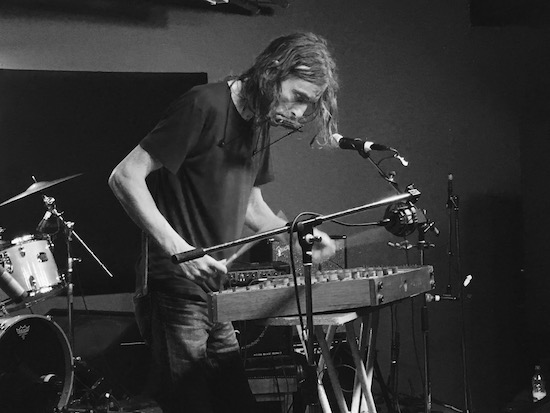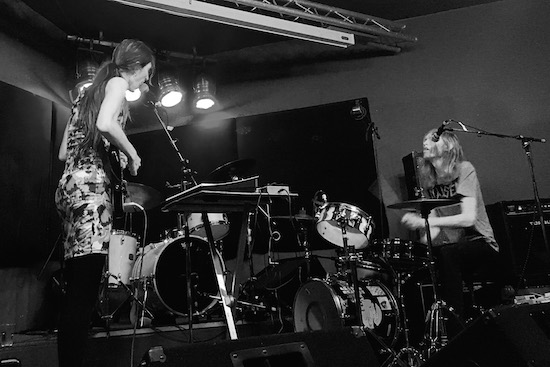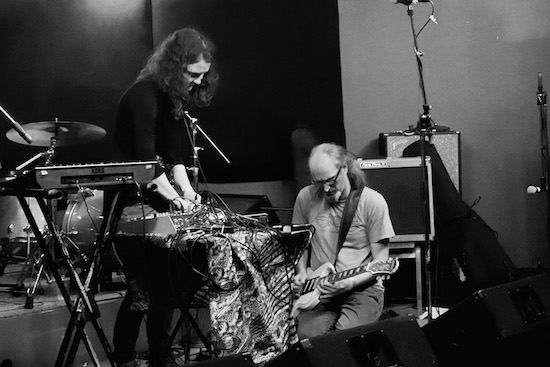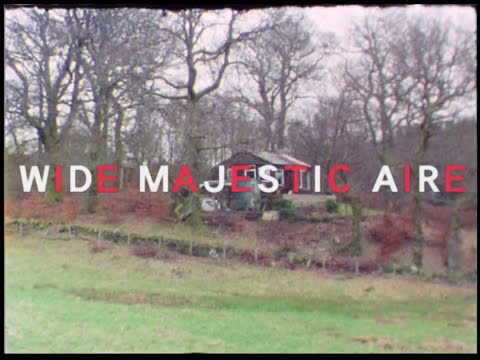Ashtray Navigations
As extortionate rents, stagnating wages and a spate of venue closures make London an increasingly less viable place in which to live and make music, it’s little wonder that regional scenes are thriving across the UK. The internet has also played its part. Why move to the increasingly shaky centre of the music biz when you can build your own little underground? So if London is over, perhaps it’s time to acknowledge Glasgow as the heart and soul of the UK DIY and experimental underground? No one would deny that Scotland’s second city is a great place to make music in, thanks to its size, infrastructure and relatively inexpensive cost of living. There’s no shortage of great music either, from the mutant Afro-dub of Golden Teacher to the shambling jazzoid indie-pop of Still House Plants.
Of course, it’s not quite so simple. From Café Oto to DIY Space For London, Corsica to New River Studios, the Smoke still has its share of crucial grassroots spaces. But rather than sit at the top of some underground hierarchy, these institutions and the scenes they support are partners in a wider network. With that in mind, it seems chauvinistic to elevate Glasgow over other vibrant scenes. It’s fair to say that the city is on an upward curve, with a range of new voices emerging and DIY promoters like Ideal Mexico and Spite House helping to fill the gap left by Cry Parrot’s Fielding Hope (now of Café Oto). But I’m reluctant to over-romanticise the city I live in. Like anywhere, there are plenty of mediocre and derivative acts around. And as the recent debacles over misogyny and transphobia at certain city venues show, there’s still work to be done in creating an inclusive scene.
The number of imaginatively programmed festivals popping up across these islands is testament to the inter-connectedness of the contemporary underground, from recent events such as Supernormal and Brighton Alternative Jazz Festival, to Total Inertia in Leeds, as well as the forthcoming Tor Festival in Todmorden and Tusk in Gateshead. That this list merely scratches the surface says it all.
Glorious Traces is Glasgow’s latest grassroots shindig, held in celebration of Southside venue the Glad Café’s fourth birthday. It’s primarily focussed on the local music community, with Alasdair Roberts, Trembling Bells’ Alex Neilson and southside electronic crew Save As among the programmers. It’s by no means a Glasgow love-in, however, with Canadian composer Ian William Craig and a host of Yorkshire acts appearing alongside the local acts. What the weekend underlines is the plurality of the Glasgow music scene and the extent to which it’s plugged in to wider developments.
Perhaps inevitably, Glorious Traces takes place on an August weekend where it’s all happening. Two of Glasgow’s most exciting new bands, weirdo punks Anxiety and the afore-mentioned Still House Plants, have shows on elsewhere. I’m unable to catch those, but I do manage to make Help Me I’m Melting, Tony Bevan’s free improv session at the Old Hairdressers. A major figure in UK free music, Bevan recently relocated to Glasgow and has been holding afternoon shows every other Saturday for the past few months, tooting horns of various sizes with everyone from Richard Youngs to Death Shanties’ Sybren Renema.
This weekend’s session is perhaps the best yet, with Luke Sutherland (Long Fin Killie, Mogwai) on guitar and violin, and Philip Marks on drums. The Manchester based Marks is one of the most underrated drummers in the UK, making balletic moves across a modified child’s kit and coaxing sonorous ripples from a Tibetan prayer bowl. Bevan’s bass sax emits foghorn blasts and bracing squalls, complimenting Sutherland’s chiming guitar figures and ragged fiddle. The saxophonist’s openness to collaboration is inspiring, and although Glasgow has a healthy improv scene, regular events like this give it a necessary focus.
So on to Glorious Traces itself (about bloody time, you cry). On the Friday evening Trembling Bells, avant-folk supergroup Sound of Yell, and barbershop proggers Honey & The Herbs rock the Glad Café itself. Meanwhile at Pollok Ex Serviceman’s Club, Alasdair Campbell and Fielding Hope, the brains behind Glasgow’s Counterflows festival, preside over a bill of experimental music.
Under the steely gaze of the Queen, whose portrait adorns the wall, Adam Campbell and Tina Krekels get abstract on modular synth and close-miked alto saxophone. This is a music of small gestures, the crackle and fizz of Campbell’s electronics locked in a cybernetic union with Krekel’s mouthpiece pops, tongue slaps and hisses. It’s not an easy listen, but this Scottish-German duo’s supreme focus is compelling. Mancunian guitarist Jon Collin offers an appealingly raw take on acoustic guitar traditions, tapping into the more experimental side of the late Jack Rose and running with it. His use of two slides to conjure rusty drones is particularly novel. Looping and manipulating his vocals through a rack of tape decks, Ian William Craig conjures angelic choirs and rolling clouds of echo and drone. It’s a beautiful sound to get lost in, but I wouldn’t have minded a little more of the ferric ooze and varispeed wooze that made his early releases so enchanting.
Saturday begins with an international folk bill overseen by Alasdair Roberts, followed by Alex Neilson’s Psychedelic Yorkshire strand, an inspired pairing of the area’s folk scene and weirdo underground. The long-running dialogue between Glasgow and Yorkshire scenes is reflected in the presence of Stephanie and Chris Hladowski, two of Neilson’s former collaborators in the free-folk big band Scatter. Her unaccompanied readings of traditional folk songs are starkly beautiful, delivering sweetness with a keen edge. Her brother’s Family Elan, meanwhile, are a hard rocking Middle Eastern psych band, driven by spiralling saz leads and sinuous riffs. They are, suffice to say, totally righteous.

Mick Flower
Leeds underground legends Mick Flower and Ashtray Navigations twist classic rock moves into scum-flecked psychedelic wig-outs. Flower builds waves of shimmering drone on a hammer dulcimer, floating over the reverberating loops with liquescent blues guitar that sounds like Michael Rother channelling Mark Knopfler. Wielding a cream and gold Gibson SG, Ashtray Navigations’ Phil Todd indulges in an unabashed display of Santana worship. His acid rock noodling is pitched against Mel Ó Dubhshláine’s synth splatter and home-brewed techno. While neither act achieves satori on this occasion, their cosmic meanderings prove absurdly entertaining.
The hands down highlights of the day couldn’t be more different. Guttersnipe’s intricately shredding noise rock carves out extreme new realms of hyper-metal, as twin vocals, guitars and electronics commune in dark, howling ecstasy. Eliza Carthy, meanwhile, is a revelation. As the daughter of Martin Carthy and Norma Waterson, Carthy is Yorkshire folk royalty. She tends to play with a band, making this solo set a rare treasure. There’s always the worry that a performer on her level will over project in a small venue like this, but she pitches it perfectly, winning the audience over with salty banter ("Do you want one about death or shagging?") and then sending us reeling with her lusty vocals and virtuoso fiddling.
Sunday afternoon’s hangover slot at the Rum Shack is deftly filled by The Sensory Illusions, Bill Well’s new duo with Danielle Price. The obvious comparison would be with Wells’ collaborators Maher Shalal Hash Baz, but instead of their parping euphonium, we have Price’s pitch-perfect tuba. Wells’ scratchy guitar work recalls Maher’s Tori Kudo, bringing a DIY punk edge to his characteristically disarming melodies, which are both playful and oddly melancholy.

Guttersnipe
The festival concludes that evening at Langside Parish Church. Under a modern day Last Supper mural, Alasdair Roberts showcases material from a forthcoming album, ably supported by vocalist Debbie Armour and Sound of Yell’s Stevie Jones and Alex Neilson. It’s quite a light, almost poppy set, buoyed by the rhythm section’s fleet accompaniment.
On paper, Ela Orleans sounds like a rather downbeat festival closer, but her self-styled "movies for ears" work beautifully in this seated venue. Having reclaimed her Upper Hell album from Howie B’s bland production, the Polish-born, Glasgow-based artist is in the ascendancy. Rather than play tracks from that Dantean opus, she performs older material alongside the mesmeric films she’s assembled from WW2 propaganda broadcasts and silent movies. Orleans brings a European arthouse aesthetic to the kitchen sink psychedelia of Pram, Broadcast and Ghost Box, her Nico-esque vocals hovering wraith-like over woozy samples and dusty beats. Uncanny and strangely moving, her set is perfectly encapsulates Glorious Traces local-to-international outlook.



